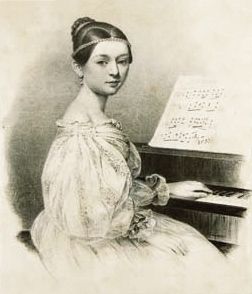Clara Schumann (1819 – 1896)
Clara Schumann was born Clara Josephine Wieck in Leipzig. Her mother was a famous singer, but her parents separated when she was about four, and she ended up in the household of her father, Friedrich Wieck, a very strict piano teacher. Under his tutelage (and certainly aided by her extraordinarily large hands), Clara Wieck became one of the century’s greatest and most famous concert pianists.

Clara began playing piano in public at the age of 9 and touring at the age of 11. Pianists of this era were expected to perform their own compositions in addition to those of others, and she obliged by composing piano pieces and songs. She began writing her Piano Concerto at the age of 13 and performed it shortly after her 16th birthday, with Felix Mendelssohn conducting.
One of Friedrich Wieck’s students was Robert Schumann, about 9 years older than Clara Wieck, who moved into the Wieck household when Clara was 8. The romance began developing several years later. They married against her father’s wishes in 1840 when Clara turned 21.
Despite some initial plans to forge an artistic collaboration of equals, Robert and Clara’s marriage became more lopsided. Clara was increasingly forced to give up her own compositional career in favor of Robert’s, to perform and promote his music in concert, to care for their children (which eventually numbered eight), and to deal with his worsening mental illness.
Soon after Robert died in an asylum in 1856, Clara stopped composing entirely. She continued her concert career until 1891, forging many friendships in the music world, and becoming a trusted mentor and consultant to Johannes Brahms. She would outlive her husband by 40 years.
These lovely Three Romances for Violin and Piano (Opus 22) are one of Clara Schumann’s last compositions, dating from 1853 and dedicated to violinist Joseph Joachim.